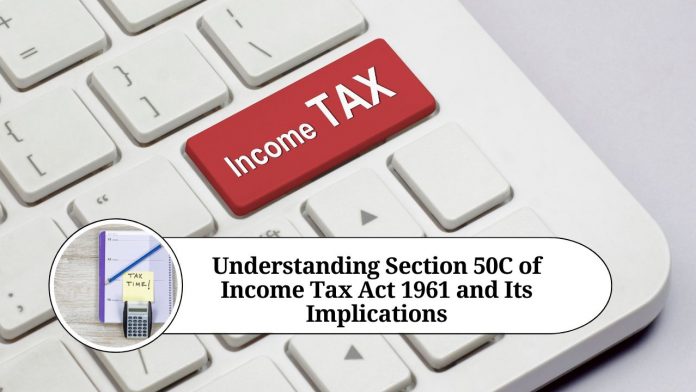Section 50C of the Income Tax Act, 1961, deals with the tax implications of transferring an immovable property below its stamp duty valuation. The section is applicable to both buyers and sellers of immovable property and aims to prevent tax evasion in property transactions. In this article, we will discuss the various aspects of section 50C and its implications.
What is Section 50C of the Income Tax Act?
Section 50C of the Income Tax Act, 1961, is a provision that applies when a property is transferred for a value lower than its stamp duty valuation. The section aims to prevent under-reporting of property transactions and tax evasion. The stamp duty valuation is the value assigned by the state government for the purpose of charging stamp duty on property transactions.
Implications of Section 50C:
The section has implications for both buyers and sellers of immovable property. If a property is transferred for a value lower than its stamp duty valuation, the following provisions of the Income Tax Act will apply:
- For the seller: The income from the transfer of the property will be calculated based on the stamp duty valuation of the property, and not the actual sale value. This means that the seller will have to pay tax on the difference between the stamp duty valuation and the sale value.
- For the buyer: If a property is acquired for a value lower than its stamp duty valuation, the difference between the stamp duty valuation and the actual sale value will be deemed as the buyer’s income. This means that the buyer will have to pay tax on the difference.
Exceptions to Section 50C:
There are certain exceptions to the application of section 50C. The section will not apply in the following cases:
- When the transfer of the property is between family members.
- When the property is transferred to or by the government.
- When the property is transferred through a will or inheritance.
- When the property is used for business or professional purposes.
Conclusion:
In conclusion, section 50C of the Income Tax Act, 1961, aims to prevent under-reporting of property transactions and tax evasion. It has implications for both buyers and sellers of immovable property. If a property is transferred for a value lower than its stamp duty valuation, the seller will have to pay tax on the difference, and the buyer will have to pay tax on the deemed income. However, there are exceptions to the application of the section, such as transfers between family members and government transfers. It is essential to understand the provisions of section 50C to avoid any tax implications in property transactions.
Read more useful content:
Frequently Asked Questions (FAQs)
Q: What is Section 50C of the Income Tax Act, 1961?
A: Section 50C is a provision of the Income Tax Act, 1961, that deals with the tax implications of transferring an immovable property below its stamp duty valuation.
Q: What is the stamp duty valuation?
A: The stamp duty valuation is the value assigned by the state government for the purpose of charging stamp duty on property transactions.
Q: Who does section 50C apply to?
A: Section 50C applies to both buyers and sellers of immovable property.
Q: What are the implications of section 50C for sellers?
A: If a property is transferred for a value lower than its stamp duty valuation, the seller will have to pay tax on the difference between the stamp duty valuation and the sale value.
Q: What are the implications of section 50C for buyers?
A: If a property is acquired for a value lower than its stamp duty valuation, the difference between the stamp duty valuation and the actual sale value will be deemed as the buyer’s income. This means that the buyer will have to pay tax on the difference.
Q: Are there any exceptions to the application of section 50C?
A: Yes, there are exceptions to the application of section 50C, such as transfers between family members, government transfers, transfers through a will or inheritance, and property used for business or professional purposes.
Q: How can one avoid tax implications in property transactions under section 50C?
A: It is essential to understand the provisions of section 50C and ensure that property transactions are carried out at or above the stamp duty valuation to avoid any tax implications.




















